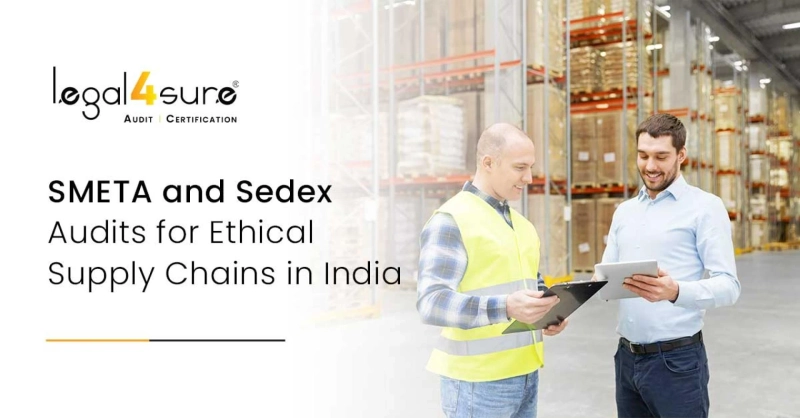Businesses are now expected to show accountability towards people and the environment, not just profits, in today's global economy. Businesses and shoppers in Europe, the United States, and other developed markets are now more likely to deal exclusively with suppliers who follow fair and honest business practices. Sedex audit and SMETA audit are two reliable methods for Indian manufacturers, exporters, and factories to demonstrate their dedication to this cause. These audits not only guarantee compliance with global standards but also provide opportunities for long-term development.
What Are SMETA and Sedex Audits?
The Sedex Members Ethical Trade Audit (SMETA) is a well-known ethical audit procedure created by Sedex member firms to evaluate a supplier's behaviour in areas such as labour standards, health and safety, environmental effects, and business ethics. It adheres to a set of standards used by recognised audit organisations, enabling buyers to compare suppliers openly and equitably.
Sedex does not conduct SMETA audits; rather, they are carried out by impartial auditors. The online platform Sedex, which stands for Supplier Ethical Data Exchange, facilitates the secure storage, management, and sharing of this ethical data between companies, customers, and partners, promoting responsible sourcing and increased transparency in the supply chain.
Key Areas Covered By A SMETA Audit
A standard SMETA audit assesses a supplier based on four core areas.
1. Standards for Labour
- No child or forced labour
- Equitable pay and hours
- Freedom of association
- No prejudice
2. Health and Safety
- A workplace that is both safe and clean
- Proper usage of personal protective gear (PPE)
- Preparation for emergencies
- Risk assessment procedures
3. Environmental Management (Optional but highly recommended)
- Waste disposal methods
- Energy and water use
- Controlling emissions
- adherence to environmental regulations
4. Business Ethics
- There should be no bribery or corruption.
- honorable conduct
- Clear record-keeping
SMETA audits can be 2-pillar (Labour + Health & Safety) or 4-pillar (all four areas), depending on buyer requirements.
Why Indian Companies Need SMETA and Sedex Audits
Indian manufacturers in sectors such as apparel, electronics, food processing, and packaging are under pressure to comply with international standards as demand for ethical sourcing increases. A Sedex audit demonstrates a company's readiness for international operations.
The main advantages are listed below:
Access to International Markets
Retail behemoths like Tesco, Marks & Spencer, and Nestlé mandate that their suppliers adhere to SMETA standards. New export contracts may not be possible without it.
Better reputation
Businesses with ethical certifications are perceived as being more accountable and trustworthy. This fosters lasting connections.
Lower Compliance Risks
In order for firms to address labour or safety concerns before they become a legal or financial liability, SMETA audits bring these concerns to light early on.
Improved Work Environment
The audit procedure frequently enhances employee satisfaction as well as safety protocols and HR systems.
Transparency and trust are essential.
Joining Sedex makes it easier to communicate audit findings and firm rules to stakeholders in an open manner.
How to Prepare for a SMETA Audit
- Join Sedex- First, complete all the information about your business on the Sedex platform by signing up there.
- Perform a self-evaluation- To find any areas of noncompliance, Sedex offers a Self-Assessment Questionnaire (SAQ).
- Pick a Reputable Auditing Company- Choose a Sedex-approved auditor who has expertise in your field.
- Educate Your Employees- Ensure that workers are aware of their rights, safety procedures, and business regulations.
- Update Documentation- Keep records like wage stubs, attendance registers, safety training logs, and waste management reports available.
- Correct Non-Compliances Before the Audit- Before any issues arising from internal checks, remedy them. This demonstrates initiative and lowers the possibility of receiving a negative report.
Common Challenges Faced by Indian Suppliers
- Insufficient Documentation: Missing wage records or safety inspection files are a common reason for audit failures.
- Subcontractor Misadministration: Even third-party vendors must adhere to moral principles, as stated by suppliers.
- Lack of Knowledge: Basic safety procedures should be taught to workers, and they should also be informed about their rights.
- Disregarding the Environment: Although it's not required, many consumers now expect businesses to include environmental inspections in their audits.
In Conclusion
Worldwide, there is an increasing demand for ethical and responsible sourcing. Indian companies must align themselves with international expectations in order to compete in the global market. The Sedex audit and the SMETA audit are more than just formalities; they reflect a company's values and dedication to ethical behaviour. Suppliers may enhance their reputation, optimise their processes, and fortify their standing in both domestic and foreign markets by investing in these audits.
Companies that see ethical audits as a component of their long-term plan, not merely a checklist, are in a better position to succeed in the future.


